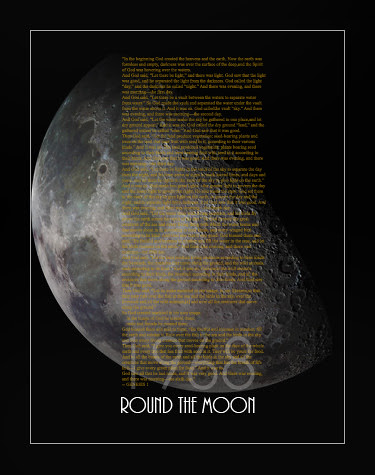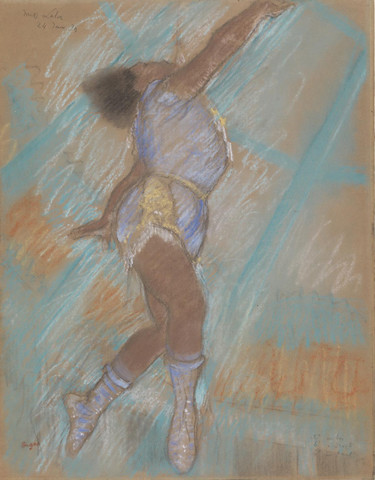
Volume XV, Issue IX
Faith and Beauty
Images that Lead to Worship and Relationship with God
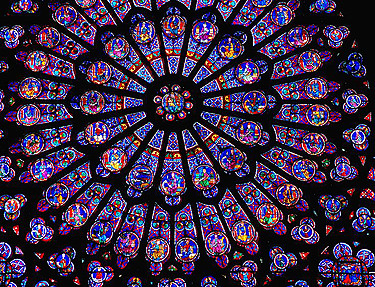
North Rose Window, Notre Dame de Paris.
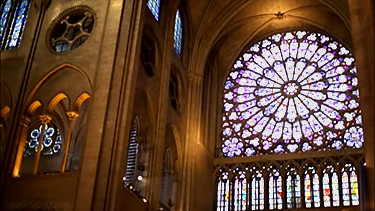
North Rose Window, Notre Dame de Paris.
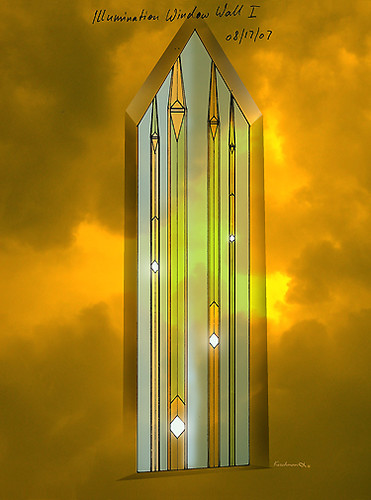
Sound Sculpture, Xaver Wilhelmy's design for functional glass organ pipes in a window combines beautiful visual imagery with beautiful music. Rendering by Bob Kirchman.
Catholicism and Beauty
By Bishop Robert Barron
A refreshing perspective on the place of the beautiful in leading to Faith.
Plato's Symposium
[click to read]

Diotima, painting by Józef Simmler, 1855. In Plato's Symposium the members of a party discuss the meaning of love. Socrates says that in his youth he was taught "the philosophy of love" by Diotima, who was a seer or priestess. Socrates also claims that Diotima successfully postponed the Plague of Athens. In a dialogue that Socrates recounts at the symposium, Diotima gives Socrates a genealogy of Love (Eros), stating that he is the son of "resource and poverty". In her view, love is a means of ascent to contemplation of the Divine. For Diotima, the most correct use of love of other human beings is to direct one's mind to love of Divinity. The beautiful beloved inspires the mind and the soul and directs one's attention to spiritual things. One proceeds from recognition of another's beauty, to appreciation of Beauty as it exists apart from any individual, to consideration of Divinity, the source of Beauty, to love of Divinity.
Concerning the things about which you ask to be informed I believe that I am not ill-prepared with an answer. For the day before yesterday I was coming from my own home at Phalerum to the city, and one of my acquaintance, who had caught a sight of me from behind, hind, out playfully in the distance, said: Apollodorus, O thou Phalerian man, halt! So I did as I was bid; and then he said, I was looking for you, Apollodorus, only just now, that I might ask you about the speeches in praise of love, which were delivered by Socrates, Alcibiades, and others, at Agathon's supper. Phoenix, the son of Philip, told another person who told me of them; his narrative was very indistinct, but he said that you knew, and I wish that you would give me an account of them. Who, if not you, should be the reporter of the words of your friend? And first tell me, he said, were you present at this meeting? (read more)
Love is...
The Ultimate Definition
Love never gives up.
Love cares more for others than for self.
Love doesn’t want what it doesn’t have.
Love doesn’t strut,
Doesn’t have a swelled head,
Doesn’t force itself on others,
Isn’t always “me first,”
Doesn’t fly off the handle,
Doesn’t keep score of the sins of others,
Doesn’t revel when others grovel,
Takes pleasure in the flowering of truth,
Puts up with anything,
Trusts God always,
Always looks for the best, Never looks back,
But keeps going to the end.
— 1 Corinthians 13:4-7 (MSG)
The Answer is IMAGO DEI
Start by Acknowledging the Image of God
By David M. Bailey
[click to read]
If you were to ask a random sample of people whether race matters in American society anymore, you would get a variety of answers. Many would say that great strides have been made since the civil rights movement. Looking back at Martin Luther King’s “I Have a Dream Speech,” they would offer that people are now judged by the content of their character rather than the color of their skin. Others would contest that racial identity still strongly influences many aspects of their lives in American society. How do we reconcile such opposing opinions? (read more)
From the Earth to the Moon
“The Father of the Lunar Module”
Thomas Joseph Kelly
We all knew that we were part of a majestic endeavour, and that we were making history happen.” – Tom Kelly
When John F. Kennedy challenged America to reach for the moon, the technology to actually land there and return safely to earth was but a concept. There was no precedent anywhere for the spaceship that would have to be built. The spacecraft developed by Tom Kelly and his Lunar Lander Team at Grumman Aircraft was the first of its kind. The stakes were high too. The craft would have to separate from the Command Module in lunar orbit, fire its descent engine to slow the craft so it would descend to the moon and then slow the craft as the astronauts set it down on the lunar surface. Because the moon has no atmosphere the craft had to descend using the rocket engine to brake it. After touchdown the astronauts would use the Lunar Module as their base and their home while they explored the moon, then the descent stage would become the launch pad for the ascent stage as it took off to rejoin the command module in space. All of this required multiple firings of the essential rockets. Everything had to work perfectly in a time-critical sequence or the astronauts would be stranded. There was no way to ‘hold’ the countdown and fix something as had been often done prior to launches on earth.
When Grumman won the contract, it was estimated that the spacecraft would cost $500 million to develop and produce, but as the seven years allotted for the project unfolded, the lunar lander proved to be much more of a challenge than anyone imagined. The first LEM was scheduled for a flight in the Fall of 1968 but as that deadline came and went engineers still worked to make the spacecraft ready. It was not until 1969 that the craft was actually flown for the first time by astronauts in earth orbit. Apollo 9 tested all of the functionality of the craft in earth orbit. Apollo 10 tested in lunar orbit but did not land on the moon. The Eagle, only the third lunar module to be flown, actually landed on the moon. The awkward little lunar lander, which had proved so difficult to develop for Kelly and his team, performed wonderfully. When Apollo 13 was crippled by an explosion in the service module, the LEM became the crew’s lifeboat. Without the critical systems of the lunar module the astronauts would have never made it home.
With NASA facing budget cuts and the American media yawning at America’s space aspirations, the agency opted for four more all-out Apollo missions with a much enhanced LEM that even included a lunar rover on the final missions. Then the Apollo Program was over. NASA refocused its resources on the Space Shuttle and the International Space Station – holding out the promise that these programs would lead to more deep space exploration in the future. The shuttle and the ISS proved to be very costly in their own right and maintaining those programs drained any resources that might have been used to take us back to the moon or on to Mars. Thus the lunar lander became a somewhat forgotten chapter in the history of space exploration. The fact remains that a group of dedicated men and women on Long Island devoted seven years of their life to developing a craft to land and function in deep space, landing on and returning from an airless world with 1/6 the earth’s gravity. They had to develop systems whose first trial would (and could only) be their actual use. This was perhaps the most ‘giant leap for mankind’ as far as spacecraft development. The machine they developed was so governed by weight requirements that it became a stripped-down spidery looking contraption unlike the streamlined Disney moon rocket of Tomorrowland. Tom Hanks, in the From the Earth to the Moon miniseries does well to compare building the LEM to Michelangelo painting the ceiling of the Sistine Chapel. I love the comparison. Tom Kelly, Lunar Module Designer, died in March of 2002. I like to think he would truly appreciate it as well.
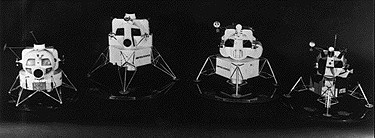
The development of the Lunar Module. NASA Photo.
Katherine G. Johnson
[click to read]
Born in 1918 in West Virginia, Katherine G. Johnson made the most of limited educational opportunities for African Americans, graduating from college at age 18. She began working in aeronautics as a "computer" in 1952, and after the formation of NASA, she performed the calculations that sent astronauts into orbit in the early 1960s and to the moon in 1969. Johnson was honored with the Presidential Medal of Freedom in 2015, and saw her story brought to light through a book and a feature film the following year. (read more)
Conversation with Katherine Johnson
The Savant Mathematician Who Mapped Trajectories
Joshua Coleman
The Unsung Hero of ‘Hidden Figures’
Then our sons in their youth will be like well nurtured plants. Our daughters will be like pillars carved to adorn a palace.” — PSALM 144:12
Perhaps the biggest story for motivating young people may be found ‘between the lines’ in the interviews with Katherine Johnson. That would be the story of her father, Joshua Coleman. She calls him the smartest person she has ever known and it is Joshua Coleman who passed on to his daughters their love of learning. A simple farmer and a logger, Coleman had a head for figures. He loved numbers and passed that love along to his children. He moved his family at one point 120 miles to Institute, West Virginia so his daughters could go to high school. There Katherine was able to accelerate her progress and not only finished high school in her teens, but college as well! The story is amazing, but is it rare and on some lofty plane where few can go? Now I must share the story of Ose F. Carpenter, my Grandfather. He had three daughters and passed a similar baton to them. O. F. Carpenter never completed college. He became ill and had to go home but as he worked in the family business manufacturing chicken coops, his genius was seen in the improvements he made to the process. At the end of his life he held several patents for machinery design.
His three daughters went to Westhampton, the women’s college now incorporated into the University of Richmond. Two studied physics, one psychology. All went on to do further study. My mother became an engineer/mathematician and did similar work to Katherine Johnson at the Martin Company in Baltimore. One of her sisters went on to medical school and became a prominent pediatric cardiologist. The other sister went to business school after college and after a semester found herself teaching classes there! Now I do not present this so as to brag on my brilliant ancestors. I present it as evidence that true genius may be nurtured in a humble environment and those who possess such Divine wonder may be quite ordinary people! I think of Dr. Ben Carson and his incredible mother, who inspired him to love learning. The story of his becoming a neurosurgeon begins with her incubating it!
One of the interviews with Katherine Johnson ends with the interviewer musing over what brilliance we are ‘missing’ by not providing education for illegal immigrants. I would challenge the interviewer to look closer to home. I do youth ministry in Waynesboro, Virginia and I see so much untapped potential. One young man who likes to identify as sort of a redneck surprised me when he embraced with fascination the concept of EX NIHILO (out of nothing) Creation. I thought THAT talk had gone way over their heads. Instead, this young man was eager to go discuss it with his astronomy teacher. The lesson I learned is that our young people are not to be underestimated. We need to keep offering them the best in the way of inspiration. Somewhere in Basic City (East Waynesboro) a brilliant young mind awaits. Our challenge is to help that young person find the spark of Divine inspiration!

Katherine Johnson was born in White Sulphur Springs, West Virginia. Her father, Joshua Coleman, worked at the Greenbrier resort in addition to farming and logging.
Photo by Bob Kirchman.
Round the Moon
By Jules Verne
CHAPTER XXII, RECOVERED FROM THE SEA
The spot where the projectile sank under the waves was exactly known; but the machinery to grasp it and bring it to the surface of the ocean was still wanting. It must first be invented, then made. American engineers could not be troubled with such trifles. The grappling-irons once fixed, by their help they were sure to raise it in spite of its weight, which was lessened by the density of the liquid in which it was plunged.
But fishing-up the projectile was not the only thing to be thought of. They must act promptly in the interest of the travelers. No one doubted that they were still living.
Yes," repeated J. T. Maston incessantly, whose confidence gained over everybody, "our friends are clever people, and they cannot have fallen like simpletons. They are alive, quite alive; but we must make haste if we wish to find them so. Food and water do not trouble me; they have enough for a long while. But air, air, that is what they will soon want; so quick, quick!"
And they did go quick. They fitted up the Susquehanna for her new destination. Her powerful machinery was brought to bear upon the hauling-chains. The aluminum projectile only weighed 19,250 pounds, a weight very inferior to that of the transatlantic cable which had been drawn up under similar conditions. The only difficulty was in fishing up a cylindro-conical projectile, the walls of which were so smooth as to offer no hold for the hooks. On that account Engineer Murchison hastened to San Francisco, and had some enormous grappling-irons fixed on an automatic system, which would never let the projectile go if it once succeeded in seizing it in its powerful claws. Diving-dresses were also prepared, which through this impervious covering allowed the divers to observe the bottom of the sea. He also had put on board an apparatus of compressed air very cleverly designed. There were perfect chambers pierced with scuttles, which, with water let into certain compartments, could draw it down into great depths. These apparatuses were at San Francisco, where they had been used in the construction of a submarine breakwater; and very fortunately it was so, for there was no time to construct any. But in spite of the perfection of the machinery, in spite of the ingenuity of the savants entrusted with the use of them, the success of the operation was far from being certain. How great were the chances against them, the projectile being 20,000 feet under the water! And if even it was brought to the surface, how would the travelers have borne the terrible shock which 20,000 feet of water had perhaps not sufficiently broken? At any rate they must act quickly.
J. T. Maston hurried the workmen day and night. He was ready to don the diving-dress himself, or try the air apparatus, in order to reconnoiter the situation of his courageous friends.
But in spite of all the diligence displayed in preparing the different engines, in spite of the considerable sum placed at the disposal of the Gun Club by the Government of the Union, five long days (five centuries!) elapsed before the preparations were complete. During this time public opinion was excited to the highest pitch. Telegrams were exchanged incessantly throughout the entire world by means of wires and electric cables. The saving of Barbicane, Nicholl, and Michel Ardan was an international affair. Every one who had subscribed to the Gun Club was directly interested in the welfare of the travelers.
At length the hauling-chains, the air-chambers, and the automatic grappling-irons were put on board. J. T. Maston, Engineer Murchison, and the delegates of the Gun Club, were already in their cabins. They had but to start, which they did on the 21st of December, at eight o'clock at night, the corvette meeting with a beautiful sea, a northeasterly wind, and rather sharp cold. The whole population of San Francisco was gathered on the quay, greatly excited but silent, reserving their hurrahs for the return. Steam was fully up, and the screw of the Susquehanna carried them briskly out of the bay.
It is needless to relate the conversations on board between the officers, sailors, and passengers. All these men had but one thought. All these hearts beat under the same emotion. While they were hastening to help them, what were Barbicane and his companions doing? What had become of them? Were they able to attempt any bold maneuver to regain their liberty? None could say. The truth is that every attempt must have failed! Immersed nearly four miles under the ocean, this metal prison defied every effort of its prisoners. On the 23rd inst., at eight in the morning, after a rapid passage, the Susquehanna was due at the fatal spot. They must wait till twelve to take the reckoning exactly. The buoy to which the sounding line had been lashed had not yet been recognized.
At twelve, Captain Blomsberry, assisted by his officers who superintended the observations, took the reckoning in the presence of the delegates of the Gun Club. Then there was a moment of anxiety. Her position decided, the Susquehanna was found to be some minutes westward of the spot where the projectile had disappeared beneath the waves.
The ship's course was then changed so as to reach this exact point.
At forty-seven minutes past twelve they reached the buoy; it was in perfect condition, and must have shifted but little. "At last!" exclaimed J. T. Maston.
Shall we begin?" asked Captain Blomsberry.
Without losing a second."
Every precaution was taken to keep the corvette almost completely motionless. Before trying to seize the projectile, Engineer Murchison wanted to find its exact position at the bottom of the ocean. The submarine apparatus destined for this expedition was supplied with air. The working of these engines was not without danger, for at 20,000 feet below the surface of the water, and under such great pressure, they were exposed to fracture, the consequences of which would be dreadful.
J. T. Maston, the brothers Blomsberry, and Engineer Murchison, without heeding these dangers, took their places in the air-chamber. The commander, posted on his bridge, superintended the operation, ready to stop or haul in the chains on the slightest signal. The screw had been shipped, and the whole power of the machinery collected on the capstan would have quickly drawn the apparatus on board. The descent began at twenty-five minutes past one at night, and the chamber, drawn under by the reservoirs full of water, disappeared from the surface of the ocean.
The emotion of the officers and sailors on board was now divided between the prisoners in the projectile and the prisoners in the submarine apparatus.
As to the latter, they forgot themselves, and, glued to the windows of the scuttles, attentively watched the liquid mass through which they were passing.
The descent was rapid. At seventeen minutes past two, J. T. Maston and his companions had reached the bottom of the Pacific; but they saw nothing but an arid desert, no longer animated by either fauna or flora. By the light of their lamps, furnished with powerful reflectors, they could see the dark beds of the ocean for a considerable extent of view, but the projectile was nowhere to be seen. The impatience of these bold divers cannot be described, and having an electrical communication with the corvette, they made a signal already agreed upon, and for the space of a mile the Susquehanna moved their chamber along some yards above the bottom.
Thus they explored the whole submarine plain, deceived at every turn by optical illusions which almost broke their hearts. Here a rock, there a projection from the ground, seemed to be the much-sought-for projectile; but their mistake was soon discovered, and then they were in despair.
But where are they? where are they?" cried J. T. Maston. And the poor man called loudly upon Nicholl, Barbicane, and Michel Ardan, as if his unfortunate friends could either hear or answer him through such an impenetrable medium! The search continued under these conditions until the vitiated air compelled the divers to ascend.
The hauling in began about six in the evening, and was not ended before midnight.
To-morrow," said J. T. Maston, as he set foot on the bridge of the corvette.
Yes," answered Captain Blomsberry.
And on another spot?"
Yes."
J. T. Maston did not doubt of their final success, but his companions, no longer upheld by the excitement of the first hours, understood all the difficulty of the enterprise. What seemed easy at San Francisco, seemed here in the wide ocean almost impossible. The chances of success diminished in rapid proportion; and it was from chance alone that the meeting with the projectile might be expected.
The next day, the 24th, in spite of the fatigue of the previous day, the operation was renewed. The corvette advanced some minutes to westward, and the apparatus, provided with air, bore the same explorers to the depths of the ocean. The whole day passed in fruitless research; the bed of the sea was a desert. The 25th brought no other result, nor the 26th. It was disheartening. They thought of those unfortunates shut up in the projectile for twenty-six days. Perhaps at that moment they were experiencing the first approach of suffocation; that is, if they had escaped the dangers of their fall. The air was spent, and doubtless with the air all their morale.
The air, possibly," answered J. T. Maston resolutely, "but their morale never!"
On the 28th, after two more days of search, all hope was gone. This projectile was but an atom in the immensity of the ocean. They must give up all idea of finding it.
But J. T. Maston would not hear of going away. He would not abandon the place without at least discovering the tomb of his friends. But Commander Blomsberry could no longer persist, and in spite of the exclamations of the worthy secretary, was obliged to give the order to sail.
On the 29th of December, at nine A.M., the Susquehanna, heading northeast, resumed her course to the bay of San Francisco. It was ten in the morning; the corvette was under half-steam, as it was regretting to leave the spot where the catastrophe had taken place, when a sailor, perched on the main-top-gallant crosstrees, watching the sea, cried suddenly: "A buoy on the lee bow!"
The officers looked in the direction indicated, and by the help of their glasses saw that the object signalled had the appearance of one of those buoys which are used to mark the passages of bays or rivers. But, singularly to say, a flag floating on the wind surmounted its cone, which emerged five or six feet out of water. This buoy shone under the rays of the sun as if it had been made of plates of silver. Commander Blomsberry, J. T. Maston, and the delegates of the Gun Club were mounted on the bridge, examining this object straying at random on the waves.
All looked with feverish anxiety, but in silence. None dared give expression to the thoughts which came to the minds of all. The corvette approached to within two cables' lengths of the object.
A shudder ran through the whole crew. That flag was the American flag!
At this moment a perfect howling was heard; it was the brave J. T. Maston who had just fallen all in a heap. Forgetting on the one hand that his right arm had been replaced by an iron hook, and on the other that a simple gutta-percha cap covered his brain-box, he had given himself a formidable blow.
They hurried toward him, picked him up, restored him to life. And what were his first words?
Ah! trebly brutes! quadruply idiots! quintuply boobies that we are!"
What is it?" exclaimed everyone around him.
What is it?"
Come, speak!"
It is, simpletons," howled the terrible secretary, "it is that the projectile only weighs 19,250 pounds!"
Well?"
And that it displaces twenty-eight tons, or in other words 56,000 pounds, and that consequently it floats!"
Ah! what stress the worthy man had laid on the verb "float!" And it was true! All, yes! all these savants had forgotten this fundamental law, namely, that on account of its specific lightness, the projectile, after having been drawn by its fall to the greatest depths of the ocean, must naturally return to the surface. And now it was floating quietly at the mercy of the waves. The boats were put to sea. J. T. Maston and his friends had rushed into them! Excitement was at its height! Every heart beat loudly while they advanced to the projectile. What did it contain? Living or dead?
Living, yes! living, at least unless death had struck Barbicane and his two friends since they had hoisted the flag. Profound silence reigned on the boats. All were breathless. Eyes no longer saw. One of the scuttles of the projectile was open. Some pieces of glass remained in the frame, showing that it had been broken. This scuttle was actually five feet above the water. A boat came alongside, that of J. T. Maston, and J. T. Maston rushed to the broken window.
At that moment they heard a clear and merry voice, the voice of Michel Ardan, exclaiming in an accent of triumph: "White all, Barbicane, white all!"
Barbicane, Michel Ardan, and Nicholl were playing at dominoes!
CHAPTER XXIII, THE END
We may remember the intense sympathy which had accompanied the travelers on their departure. If at the beginning of the enterprise they had excited such emotion both in the old and new world, with what enthusiasm would they be received on their return! The millions of spectators which had beset the peninsula of Florida, would they not rush to meet these sublime adventurers? Those legions of strangers, hurrying from all parts of the globe toward the American shores, would they leave the Union without having seen Barbicane, Nicholl, and Michel Ardan? No! and the ardent passion of the public was bound to respond worthily to the greatness of the enterprise. Human creatures who had left the terrestrial sphere, and returned after this strange voyage into celestial space, could not fail to be received as the prophet Elias would be if he came back to earth. To see them first, and then to hear them, such was the universal longing.
Barbicane, Michel Ardan, Nicholl, and the delegates of the Gun Club, returning without delay to Baltimore, were received with indescribable enthusiasm. The notes of President Barbicane's voyage were ready to be given to the public. The New York Herald bought the manuscript at a price not yet known, but which must have been very high. Indeed, during the publication of "A Journey to the Moon," the sale of this paper amounted to five millions of copies. Three days after the return of the travelers to the earth, the slightest detail of their expedition was known.
There remained nothing more but to see the heroes of this superhuman enterprise.
The expedition of Barbicane and his friends round the moon had enabled them to correct the many admitted theories regarding the terrestrial satellite. These savants had observed de visu, and under particular circumstances. They knew what systems should be rejected, what retained with regard to the formation of that orb, its origin, its habitability. Its past, present, and future had even given up their last secrets. Who could advance objections against conscientious observers, who at less than twenty-four miles distance had marked that curious mountain of Tycho, the strangest system of lunar orography? How answer those savants whose sight had penetrated the abyss of Pluto's circle? How contradict those bold ones whom the chances of their enterprise had borne over that invisible face of the disc, which no human eye until then had ever seen? It was now their turn to impose some limit on that selenographic science, which had reconstructed the lunar world as Cuvier did the skeleton of a fossil, and say, "The moon was this, a habitable world, inhabited before the earth. The moon is that, a world uninhabitable, and now uninhabited."
To celebrate the return of its most illustrious member and his two companions, the Gun Club decided upon giving a banquet, but a banquet worthy of the conquerors, worthy of the American people, and under such conditions that all the inhabitants of the Union could directly take part in it.
All the head lines of railroads in the States were joined by flying rails; and on all the platforms, lined with the same flags, and decorated with the same ornaments, were tables laid and all served alike. At certain hours, successively calculated, marked by electric clocks which beat the seconds at the same time, the population were invited to take their places at the banquet tables. For four days, from the 5th to the 9th of January, the trains were stopped as they are on Sundays on the railways of the United States, and every road was open. One engine only at full speed, drawing a triumphal carriage, had the right of traveling for those four days on the railroads of the United States.
The engine was manned by a driver and a stoker, and bore, by special favor, the Hon. J. T. Maston, secretary of the Gun Club. The carriage was reserved for President Barbicane, Colonel Nicholl, and Michel Ardan. At the whistle of the driver, amid the hurrahs, and all the admiring vociferations of the American language, the train left the platform of Baltimore. It traveled at a speed of one hundred and sixty miles in the hour. But what was this speed compared with that which had carried the three heroes from the mouth of the Columbiad?
Thus they sped from one town to the other, finding whole populations at table on their road, saluting them with the same acclamations, lavishing the same bravos! They traveled in this way through the east of the Union, Pennsylvania, Connecticut, Massachusetts, Vermont, Maine, and New Hampshire; the north and west by New York, Ohio, Michigan, and Wisconsin; returning to the south by Illinois, Missouri, Arkansas, Texas, and Louisiana; they went to the southeast by Alabama and Florida, going up by Georgia and the Carolinas, visiting the center by Tennessee, Kentucky, Virginia, and Indiana, and, after quitting the Washington station, re-entered Baltimore, where for four days one would have thought that the United States of America were seated at one immense banquet, saluting them simultaneously with the same hurrahs! The apotheosis was worthy of these three heroes whom fable would have placed in the rank of demigods.
And now will this attempt, unprecedented in the annals of travels, lead to any practical result? Will direct communication with the moon ever be established? Will they ever lay the foundation of a traveling service through the solar world? Will they go from one planet to another, from Jupiter to Mercury, and after awhile from one star to another, from the Polar to Sirius? Will this means of locomotion allow us to visit those suns which swarm in the firmament?
To such questions no answer can be given.
THE END
Ken Mattingly’s Wedding Band
Apollo 16 Astronaut’s Lost Ring
As Apollo 16 sped toward the moon in 1972, Astronaut Ken Mattingly made a disturbing discovery, his wedding ring was missing! It wasn’t until day nine of the mission that fellow astronaut Charlie Duke noticed the floating ring – about to drift out into space while Mattingly was engrossed in an experiment. As Duke tells it, he tried to grab the ring but missed. He got a lucky break when the ring bounced off Mattingly’s helmet and then Duke was able to grab it! Mattingly was a bachelor when he was pulled from the crew of Apollo 13 for fear of rubella (German measles) exposure. He married his wife Elizabeth in June of 1970. They have one son.
A Case for National Vison
By Bob Kirchman
The year was 1968. Christmas Eve fifty years ago saw us riveted to our television sets as the Apollo 8 astronauts read the creation account from GENESIS. Reaching the moon, a challenge handed to us by President John Fitzgerald Kennedy, became a national vision. We saw the need to keep pace with the Russians for our own survival. By making it into a civilian program and emphasizing peaceful exploration, Kennedy’s vision took us higher. While it is tempting to say “times were simpler then,” the truth is that the times were anything but simple. Dr. Martin Luther King was brutally murdered as he worked to bring basic rights to African-American people who themselves faced vicious threats. We forget how violent the times were. We forget about the conflict in Vietnam and the violent protests back home. We forget the challenges surrounding that time when we all came together to watch mankind reach for the moon.
Yesterday I listened to a Christmas speech by Ronald Reagan. It was amazing how direct his words were as he addressed the oppression in Poland at the time. I think Lech Wałęsa, the head of Solidarity, was in prison at the time. Those were troubled times as well. My point is that I don’t think we have to wait for some time of national harmony before we pursue vision again – we need to pursue vision in turbulent times. What would happen if our leadership challenged the Russians again? What if we challenged them in bringing new trade routes through the world through a project to join Asia to North America through a Bering Strait Bridge? If we’re supposed to be guilty of ‘colluding with Russia,’ why not ‘collude!’ But let us do so in a way that truly brings the world together. The great ships and industries that ushered in the richness of the Twentieth Century did not exist in prior centuries. They were built around the turn of the century! We need to give our children and grandchildren better vision. We need to teach them to reach for the stars like we did fifty years ago.
Our young people need people in their lives like Sonya Carson and Joshua Coleman, who convinced their children that they could indeed succeed when taking on the challenges that faced them. Sonya’s son Ben became the famed neurosurgeon. Coleman’s daughter Katherine plotted John Glenn’s launch trajectory and pinpointed his landing. She continued with the space program through Gemini, Apollo and the Space Shuttle. The purpose of national goals, it might be rightly said, is to place a shared vision in front of just such young people as we seek to meet the challenges of our day. Though not all will embrace the vision, it should be wide enough that it is seen by most as a shared goal. Securing our position on the high ground of space was seen as generally supporting the strength and health of America. It had the effect of creating opportunity for those like Katherine Johnson who participated in it. Not only did it create new opportunity for a broad spectrum of the population, the space program also gave us new technologies and materials. That birthed a host of new and beneficial industries. Artificial hips and solar energy spring from space research, to name a few.

Image of Moses in the U. S. Capitol. Architect of the Capitol.
How Christianity Changed the World
[click to read]
By Jason Benedict
How Christianity Changed the World is worthy of the commitment it takes to finish. In this lengthy work, Alvin Schmidt does an excellent and thorough job of showing how Christianity and the teachings of Christ have changed the world for the better. He traces the impact of Christianity on values that many in the world take for granted. This impact can be seen in many places, but none more evident than in the value we put on human life. Our modern day value of human life was rooted in teachings of Christ and the actions of early Christians in rescuing newborn babies abandoned on the trash heaps of Rome. Whether through infanticide, gladiatorial games, glorification of suicide or human sacrifice there was an almost global attitude that human life was cheap before Christianity. The most beneficial institutions of our society find their roots in the influence of Jesus Christ. Early Christians founded the first hospitals, orphanages, and feeding programs combating the pervading view of the time than it would be better to just let the sick, the poor, and the orphans die. Monastic libraries provided the inspiration for the first universities in the twelfth and thirteenth century. (read more)
From the Earth to the Moon
The Last Words on the Moon
The Legend and the Transcript
Forty-six years ago the last American mission to the moon wrapped up on December 14th as the last lunar module ascent stage blasted off to bring astronauts Gene Cernan and Jack Schmitt home from the moon. Cernan had prepared a little speech to give before they lifted off and he delivered it like this: “As I take man's last step from the surface, back home for some time to come (but we believe not too long into the future), I'd like to just say what I believe history will record: That America's challenge of today has forged man's destiny of tomorrow. And, as we leave the Moon at Taurus-Littrow, we leave as we came and, God willing, as we shall return: with peace and hope for all mankind.” Cernan’s daughter had asked him to bring her back a moonbeam and his last act before reentering the lunar module was to write her name in the lunar soil.
But now the delicate business of getting off the moon began. NASA logged transcripts of crew communications and the official transcript reads as follows:
188:00:38 Cernan: Take your final look at the valley of Taurus-Littrow, except from orbit. (Pause) Okay, one minute, Houston. We're 50 seconds now, and we're Go.
188:00:51 Fullerton: Roger. You're looking good here.
188:00:55 Schmitt: I'll get that (camera) at 30.
188:00:57 Cernan: Okay. (Pause)
188:01:10 Schmitt: Camera's not going to run without me holding it.
188:01:20 Cernan: Okay. Average G, 20 seconds.
[Cernan - "This was a routine in the PGNS to start recording data from the accelerometers."]
188:01:23 Schmitt: Ah, shoot!
188:01:25 Cernan: Okay. Now, let's get off. Forget the camera. (Garbled)...
MPEG Clip by Kipp Teague (30 sec; 3.9 Mb)
188:01:27 Schmitt: Ten seconds.
188:01:28 Cernan: ...10 seconds.
188:01:29 LM Crew: Abort Stage.
188:01:30 Cernan: ...pushed. Engine Arm is Ascent.
188:01:32 Schmitt: Okay. I'm going to get the Pro. (Pause) 99 Proceeded 3, 2, 1...
188:01:39 Schmitt: Ignition.
Walter Cunningham in his book The All-American Boys, insists that Cernan’s last words on the moon were “Let’s get this mother out of here.” When offered the official transcript, he says that it actually happened in the 188:01:25 remark by Cernan (the garbled part), but even if that was the garbled message, the context is more like “get back to the time-critical business of preparing for liftoff.” It makes a good addition to the legend of twelve very human Americans who walked on the moon, but if it happened at all, it was not so much a statement as a friendly admonition of one crewman to another to get back to business.
The astronauts were amazing men who took calculated risks in stride because they were pilots. Jack Schmitt was the first scientist-astronaut and the first of what we would call mission specialists today. Cernan, a pilot, might have certainly made the legendary remark but I think he and Schmitt were mostly focused on task and in the short bursts of communication mode necessary for the task at hand.

